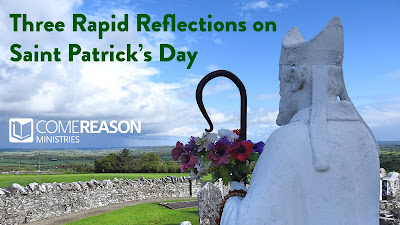People take pride in their
heritage. It’s part of who they are and how they understand themselves. Our family
traditions, the foods we eat, our shared celebrations and habits become valuable
to us and help define us. The English hold parades on St. George’s Day and Americans
will come together to celebrate the Fourth of July.
In school we are taught about
our heritage. Americans learned about people like George Washington, Thomas Jefferson,
and Abraham Lincoln--and significant events like the Continental Congress and the
Civil War. Any Greek can tell you about Socrates or Alexander the Great. The French
learn the exploits of Charlemagne and the theories of Rosseau.
But what about
our Christian heritage?
Shouldn’t we as Christians pass to our children our spiritual
heritage with the same importance and fervor as we give our cultural heritage? Any
American who doesn’t know the Fourth of July is America’s birthday is considered
uninformed. But how much do you know about the events that helped believers better
understand and grow closer to God? What are their stories? How did they survive
and even thrive in the face of brutal persecutions? Just what was the Council of
Nicaea or the Great Schism? What made Luther nail his complaints to that Wittenberg
church and how did our church fathers answer the deadly heresies that threatened
the faith which was once for all delivered to the saints?
These are important
stories to tell. That’s why the Come Reason Podcast has launched a series taking
you on a journey of exploration--uncovering remarkable stories and discovering incredible
insights into some of the most significant people and events that helped shaped
our Christian faith into the world-transforming force it became.
Did you know
the Jehovah’s Witnesses’ theology was examined and defeated by the early church
councils? Or that most of the objections raised by today’s new atheists like Richard
Dawkins and Sam Harris were answered by a man who lived 1600 years ago?
There
is so much of our past that we’ve neglected, and so much we can learn from those
who went before us. Join me at the beginning of this new year as we go on
a treasure hunt to discover the Hidden Riches of Christian History. Here’s the first
installment.
Series #1: Eleven Breaking into the Upside-Down
The first Christians
were part of a world that was so different from our own that we would hardly recognize
it. Not only did they battle persecution and discrimination, but the very values
we now take for granted — like individuals being equal — were considered strange
and dangerous. Rome saw the teachings of Christianity as a threat to their culture
and they were right. The eleven apostles took the Gospel of Jesus and broke through
the upside-down culture of ancient Rome to establish a new way of thinking, paying
for it with their blood.


